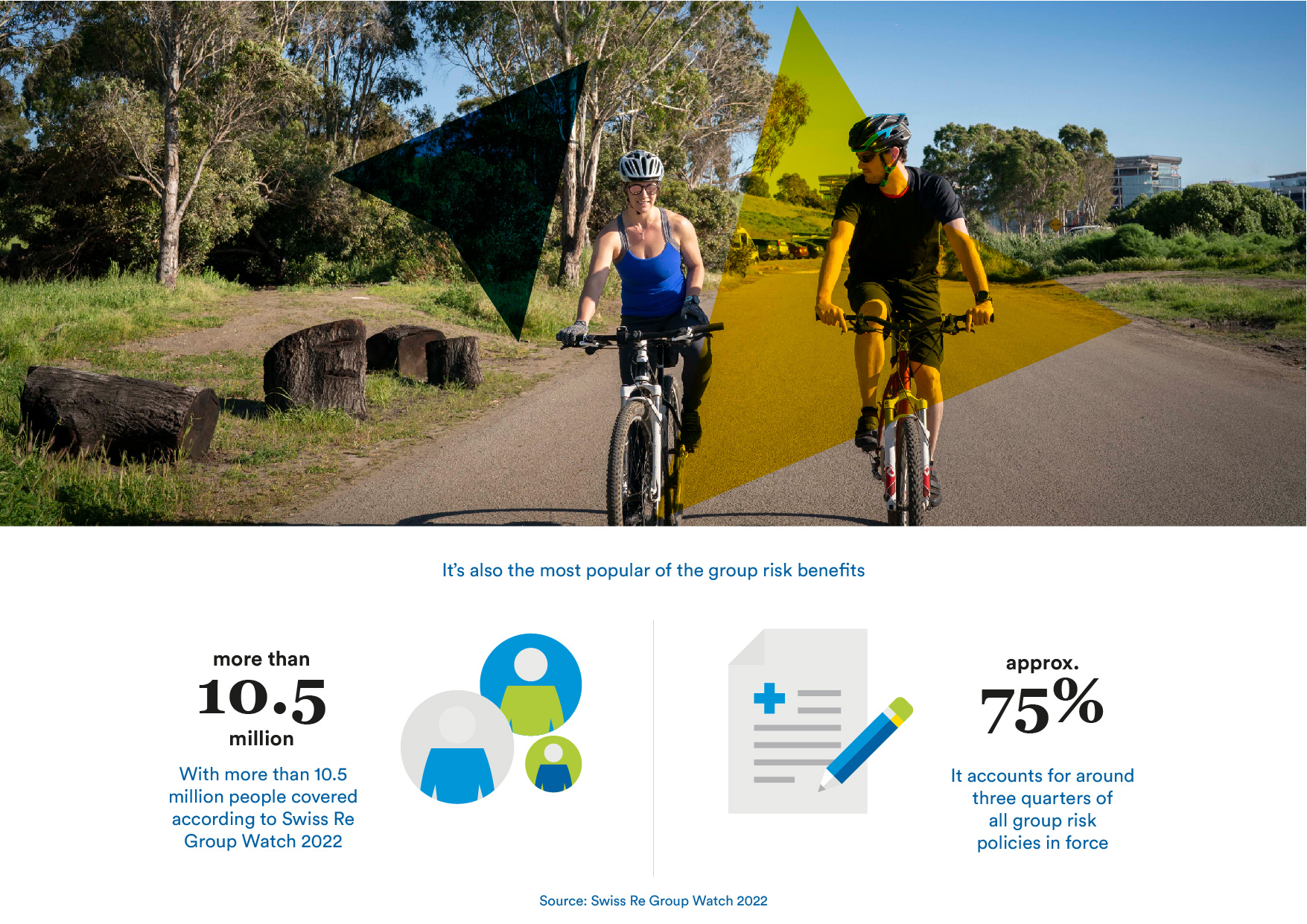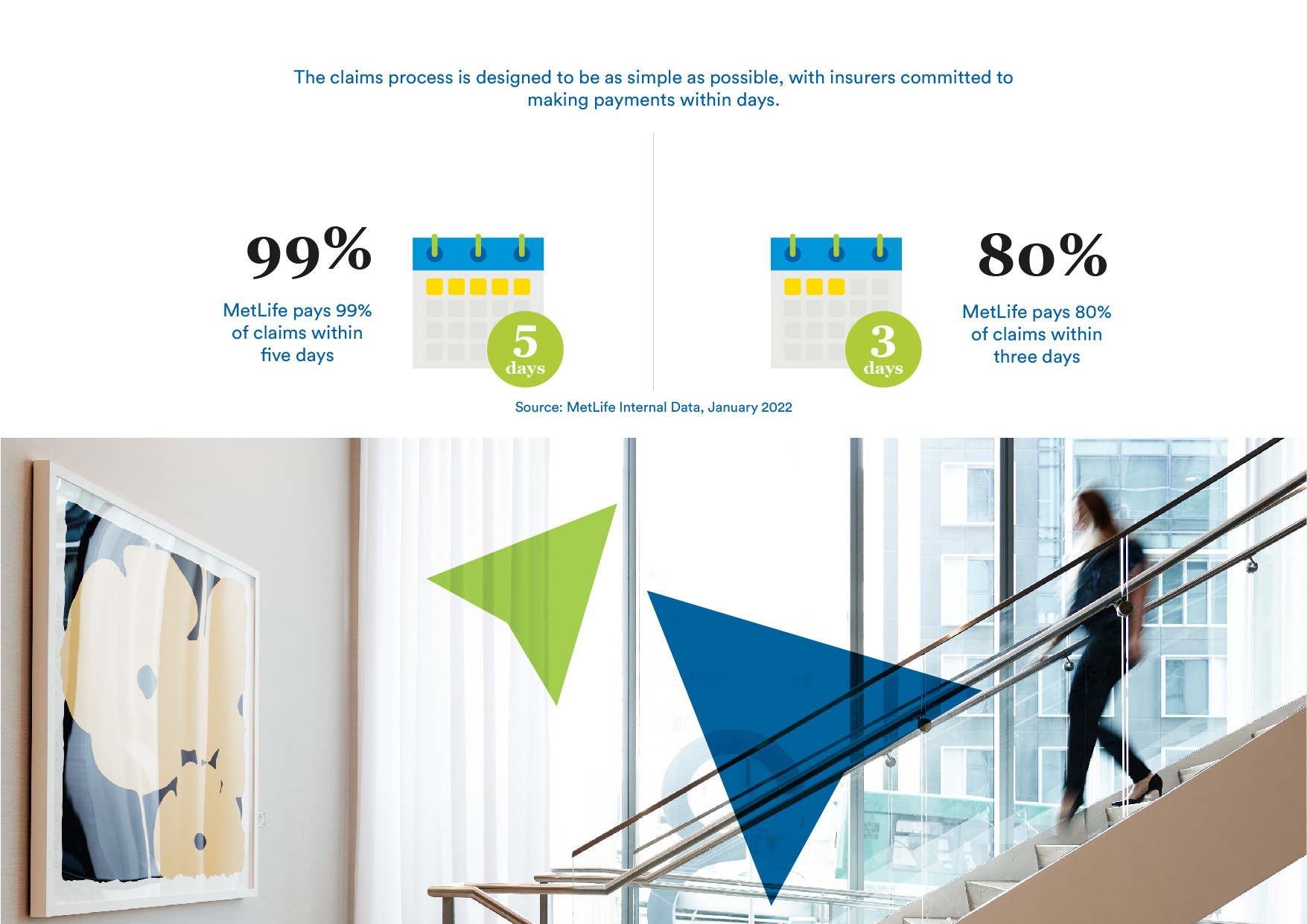
What is group life?
Group life insurance is the simplest of the group risk benefits, providing an employee with the reassurance that, in the event of their death, their dependants will receive a tax-free lump sum.
What is group life?
Group life insurance is the simplest of the group risk benefits, providing an employee with the reassurance that, in the event of their death, their dependants will receive a tax-free lump sum.
Offering employees group life insurance benefits employers too. It’s a low-cost way to demonstrate the organisation cares about its employees and their families, which can help to attract and retain key talent.
It’s also the most popular of the group risk benefits. With more than 10.5 million people covered according to Swiss Re Group Watch 2022, it accounts for around three quarters of all group risk policies in force.
And it provides a valuable benefit. In 2021, group life insurers received 13,479 claims, valued at more than £1.57 billion. Across these, the average claim was £116,414 and the main causes of claim were cancer (33%) and heart disease (16%).

Tax-efficient benefit
Group life insurance policies can utilise discretionary trust to ensure the proceeds don’t form part of the employee’s estate if they die. Doing this means there’s no inheritance tax to pay and the beneficiaries receive their money quickly and without having to wait for probate.
There are also tax efficiencies for employers. Premiums can be offset against corporation tax and are not regarded as a benefit in kind.
Types of group life policy
Group life insurance can be set up as either a registered policy or an excepted policy, with pros and cons to each.
Registered policies
Registered policies are the more common. These need to be registered with HMRC and, if the employee dies, any payout will count towards the pension lifetime allowance. Bust the allowance – £1.073m until 2026 – and any excess will be subject to a 55% tax charge.
The other drawback is that any employee who has applied for fixed protection on their pension lifetime allowance will not be able to become a member of a registered group life insurance policy.
Excepted policies
Excepted policies seek to address these issues as payouts do not count towards an employee’s lifetime allowance. However, they are subject to complicated trust rules, which increase the amount and cost of administration as well as the risk of a tax charge.
These additional complexities and costs mean the number of excepted group life policy members has fallen back in recent years. But, with the lifetime allowance frozen until 2026, this trend may reverse.
Death in service pensions or DISP
Another form of group life insurance is also available – the death in service pension. This pays a pension to the employee’s dependants but the costs associated with administering this type of arrangement means it’s a shrinking market.
Today, it only accounts for around two per cent of the group life insurance market in terms of the number of people covered and is expected to shrink further as employers modernise their benefits by switching to lump sum cover.
Benefit levels
The amount of life insurance cover provided to an employee is usually a multiple of their salary, for example four times salary, or a fixed sum, for instance £50,000.
Employers can mix and match benefits across the workforce, for instance providing new joiners with a fixed sum and more long-standing employees with a more generous multiple of salary.
Life insurance can also be offered as a flexible benefit, with the employer providing a core benefit, one or two times salary say, and allowing employees to take out additional cover if they want.
This flexible approach can work particularly well with today’s diverse workforce. Although life insurance is a highly appreciated benefit, especially for those employees with partners or kids, the prospect of a large pay out won’t necessarily appeal to those without a family to support financially.
Setting up a group life scheme
Group life insurance is a simple proposition but there a few things to consider when setting up a scheme.
Cover can go up to age 75 and the insurer will require employee details such as age, occupation and salary to provide a quote.
There is usually no need to provide medical information as insurers offer generous free cover limits, sometimes in excess of £1m. These limits are tailored to the scheme but only those employees requiring higher levels of group life will need to provide medical information.
The principal employer must be UK-based to offer a group life insurance scheme.
Making a claim
The claims process is designed to be as simple as possible, with insurers committed to making payments within days. For example, MetLife pays 99% of claims within five days and 80% within three days.
If the group life insurance policy is written under a discretionary trust, the payout will go directly to the trust, with the trustees ultimately responsible for deciding who receives it. Although this might sound risky, their decision will take into consideration the employee’s expression of wish form, where they can list their beneficiaries. It’s even possible to leave some – or all – of the proceeds to a favourite pet.

More than a lump sum
Providing the family of a deceased employee with a lump sum can help to remove financial stress but the group life insurance industry recognises that emotional and practical support is also important.
Insurers will often offer support to the family of the employee following a bereavement. As an example, at MetLife, we offer free bereavement and probate support, with up to six face-to-face bereavement counselling sessions.
Additionally, group life insurers recognise that employees can benefit from more than the peace of mind of knowing their family is financially protected. Modern policies include a range of support, including health and wellbeing advice and information and access to an employee assistance programme.
This ensures that today’s group life insurance proposition is well rounded, looking after all aspects of an employee’s health and wellbeing and providing employers with a valuable tool to attract and retain talent.
Join the MetLife Academy mailing list
Subscribe and get access to new content when it becomes available.